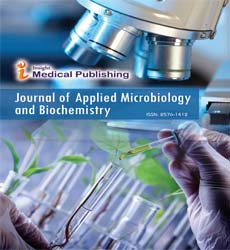ISSN : ISSN: 2576-1412
Journal of Applied Microbiology and Biochemistry
Emerging Trends in Applied Microbiology from Research Practical Applications
Frieder Dong*
Department of Microbiology, University Hospital Münster, Münster, Germany
- *Corresponding Author:
- Frieder Dong
Department of Microbiology, University Hospital Münster, Münster,
Germany,
E-mail: dong@outlook.com
Received date: May 17, 2024, Manuscript No. IPJAMB-24-19279; Editor assigned date: May 20, 2024, PreQC No. IPJAMB-24-19279 (PQ); Reviewed date: June 03, 2024, QC No. IPJAMB-24-19279; Revised date: June 10, 2024, Manuscript No. IPJAMB-24-19279 (R); Published date: June 17, 2024, DOI: 10.36648/2576-1412.8.3.230
Citation: Dong F (2024) Emerging Trends in Applied Microbiology from Research Practical Applications. J Appl Microbiol Biochem Vol. 8 No. 3:230.
Description
Microbiology, as a field of scientific inquiry, has seen significant advancements in recent years, particularly in applied microbiology. This branch of microbiology focuses on the practical applications of microorganisms in various industries and disciplines, ranging from agriculture to medicine. In this article, we explore some of the notable advances in applied microbiology, highlighting their implications and potential future directions. Advances in applied microbiology are driving progress across diverse fields, from agriculture and industry to medicine and the environment. By harnessing the remarkable capabilities of microorganisms, scientists are paving the way for sustainable practices, innovative technologies, and improved quality of life. As research continues to unfold, the potential of applied microbiology to address global challenges remains profound and promising.
Types of microbiology
One area where applied microbiology has made substantial strides is in agriculture. The use of beneficial microorganisms such as bacteria and fungi to enhance soil fertility and plant health has gained prominence. For instance, the development of microbial inoculants that promote plant growth by fixing nitrogen or enhancing nutrient uptake represents a significant breakthrough. These inoculants not only improve crop yields but also reduce the need for chemical fertilizers, thereby promoting sustainable agriculture practices. Moreover, research in agricultural microbiology has delved into the microbiome of plants, uncovering complex interactions between microorganisms and their host plants. This understanding has led to the development of biocontrol agents that can combat plant pathogens without harming beneficial microbes or the environment.
The application of microbiology in agriculture is thus pivotal for ensuring food security and environmental sustainability in a changing climate. In industrial settings, microbiology plays a vital role in biotechnology, bioengineering, and pharmaceuticals. Advances in genetic engineering and synthetic biology have enabled the design of microorganisms capable of producing valuable compounds such as enzymes, biofuels, and pharmaceuticals. Microbial fermentation processes, once limited to traditional industries like brewing and cheese-making, are now tailored for producing a wide range of products sustainably and economically. Furthermore, the discovery and optimization of extremophiles-microorganisms thriving in extreme environments-have expanded the industrial toolkit.
These extremophiles produce enzymes that operate under conditions of high temperature, acidity, or salinity, making them ideal for industrial processes that require robust enzymes. The application of extremophiles in industrial microbiology underscores the potential for developing novel biocatalysts and bio products. In medicine, applied microbiology continues to drive innovations in diagnostics, therapeutics, and disease prevention. The advent of high-throughput sequencing technologies has revolutionized microbial genomics, allowing for rapid identification of pathogens and elucidation of their resistance mechanisms.
This capability is critical for managing infectious diseases and combating antimicrobial resistance-a global health threat exacerbated by misuse of antibiotics. In addition, the human microbiome project has revealed how microbial communities influence human health and disease. Microbiome-based therapies, such as fecal microbiota transplantation for treating Clostridioides difficile infections, exemplify how understanding microbial ecosystems can lead to novel medical interventions. Additionally, the development of probiotics-beneficial microbes that confer health benefits when consumed-represents a burgeoning field in medical microbiology, with implications for gastrointestinal health and beyond.
Future directions
Looking ahead, the field of applied microbiology is poised for continued growth and innovation. Emerging technologies, such as CRISPR-based gene editing and single-cell omics, promise to further transform how microorganisms are engineered and utilized. Integrating microbiology with artificial intelligence and machine learning offers new avenues for predicting microbial behavior and optimizing biotechnological processes. Moreover, interdisciplinary collaborations will be essential for addressing complex challenges at the intersection of microbiology, biotechnology, and sustainability. Ethical considerations regarding the use of genetically modified organisms and microbiome-based therapies will also shape the future landscape of applied microbiology. Applied microbiology also addresses environmental challenges, including bioremediation and waste management.
Microbial consortia capable of degrading pollutants, such as hydrocarbons and pesticides, offer sustainable solutions for environmental cleanup. Similarly, microbial processes are harnessed in wastewater treatment plants to break down organic matter and remove contaminants, contributing to water purification efforts worldwide. Furthermore, microbiology contributes to understanding the impact of climate change on microbial ecosystems and vice versa. Studying microbial responses to environmental stressors provides insights into ecosystem resilience and adaptation strategies. Applied microbiologists collaborate with environmental scientists and policymakers to develop strategies for mitigating climate change effects through microbial interventions.
Open Access Journals
- Aquaculture & Veterinary Science
- Chemistry & Chemical Sciences
- Clinical Sciences
- Engineering
- General Science
- Genetics & Molecular Biology
- Health Care & Nursing
- Immunology & Microbiology
- Materials Science
- Mathematics & Physics
- Medical Sciences
- Neurology & Psychiatry
- Oncology & Cancer Science
- Pharmaceutical Sciences
